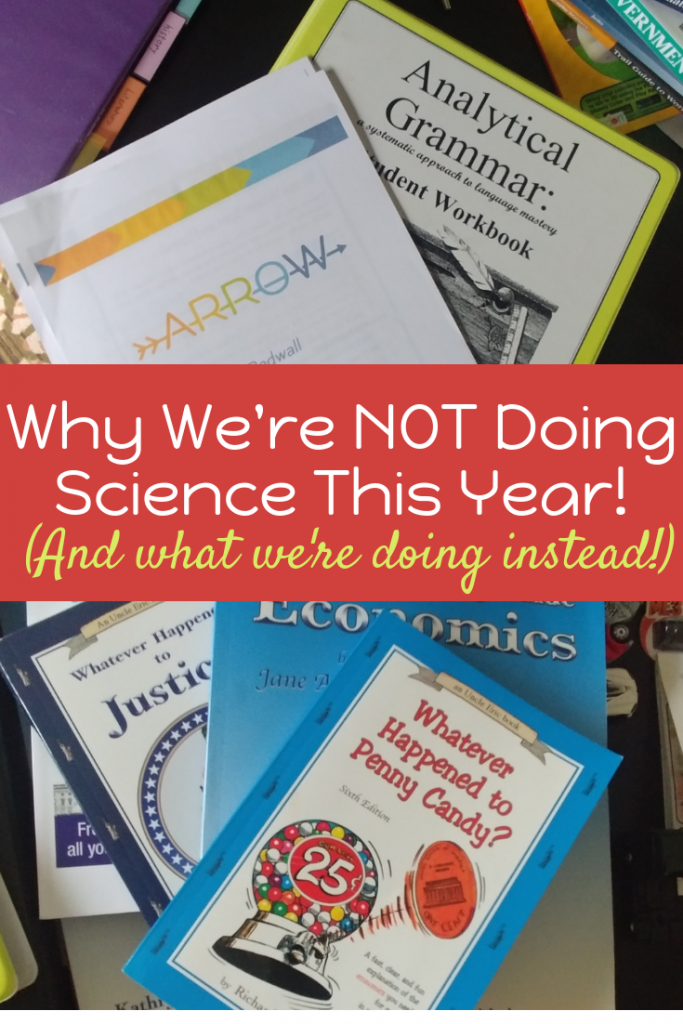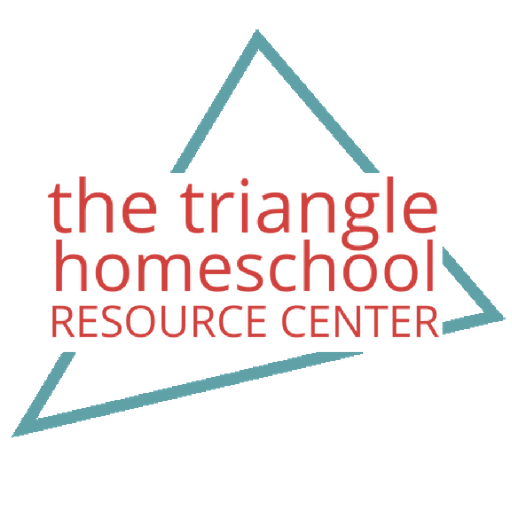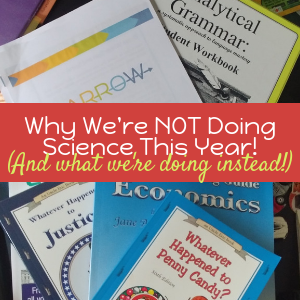When you think of core subjects in your homeschool, what comes to mind? For most, it’s the full suite of math, English, science, history, and some electives. But if you’re getting bogged down in all of that planning and keeping up with all of those subjects, maybe it’s time to exercise some homeschool freedom! Drop what’s not working. Deep dive into what is. Here’s a look at what is on my homeschool curriculum shelf for 2018-2019 and how NOT doing science this year works for us.

Take the homeschool freedom you’re given!
I’m not sure if there is a state where you have to cover science every year, but it is not a required subject in North Carolina. In fact, we have no requirements on what to teach or when. So, I don’t know about you, but I like to stretch a little and take advantage of some of the freedoms we’re given as homeschoolers.
When I started looking at curriculum for this year – our first year with a high schooler and a middle schooler – I realized I just wasn’t excited about teaching science anymore. It was great when my kids were younger and we’d pick up whatever library books and unit studies that tickled our fancy. And then we’d make messes and have some really sticky fun. For several years, we sought out co-ops specifically for hands-on science, and I even volunteered most of the time to teach those classes.
But when faced with planning high school level science? And a middle schooler who couldn’t care less? I just wasn’t feelin’ it. Neither were the kids.
We’re taking a break from science.
By the time this realization struck me, it was too late to get my oldest into a high school level co-op for a lab. (It is kinda hard to find those pick-and-choose classes, anyway.) So I came up with a plan: we’re going to skip science this year, spend more time on the subjects we’re interested in right now, and double-up — or not — when the opportunity presents itself.
Our long-term homeschool goals are to enjoy learning, to prepare for a lifetime of it, and to keep open any door that might provide a future opportunity. In light of that, not knowing yet whether my kids are headed to college, we’re going to prepare as best we can as if they were. But if they say they’re not enjoying science right now, then we’re not going to let it kill their love for learning. It’s all about balance.
The typical freshman in high school will study physical sciences and American History, both of which we’ve covered ad nauseam. I could let science go for a year, but history too? Since starting World Geography last spring, we’d had some great discussions about how countries are run and how they interact. We realized there were gaps in some more practical aspects of civic life, so when I proposed filling those, my kids’ ears perked up. Economics and American Government? Why, yes! This was something we could dig into with vigor.
What’s on our shelf for 2018-2019
I use the term ‘shelf’ loosely. I really mean that these are the books and resources scattered about our homeschool room. You won’t judge me for the mess, right?
By public school standards, my kids are in 7th and 9th grades this year. They do as much in common as they can, and I adapt how I work with them on it based on their personalities and learning styles. I have resources to keep the toddler occupied. You can find all of the great websites I used for those on my Pinterest Board called Toddlers In Your Homeschool.
Language Arts
Language arts is the cornerstone of our homeschool. We do as much reading from real books as possible, and we avoid textbooks. As a result, this list looks a little lean, but we are really doing a lot of reading in every subject area.
-
Analytical Grammar
Both kids will be using this curriculum over the next two school years. We’ve only dabbled in grammar before, so this is proving to be tough for all of us. I was an excellent English student, but I only scored an 80% on their last test. I’m not too worried about the 7th grader getting a full grasp of the material at this point, but I’d like for the 9th grader to be able to do this once and done. He’s doubling up by also going through Analytical Grammar‘s online program called GrammarPlanet. That has been really helpful filling the gaps for Mom as well!
-
Beyond the Book Report
Also by the creators of Analytical Grammar, Beyond the Book Report covers literary analysis, poetry, research papers, and other writing skills. We’ll swap out grammar and use this according to Analytical Grammar‘s suggested two-year schedule. I’m not sure if this will be something both kids do, or only the 9th grader since she is using the BraveWriter resources for literature analysis.
-
BraveWriter Arrow subscription
We have been using the literature guides called Arrows from BraveWriter for several years and we LOVE them. I’ve set up a once-per-month book club for my 7th grader to do the “Party School” ideas included at the end of each guide. Since we read these books as family read-aloud, the 9th grader will get to experience the great literature, but he won’t be doing the guide along with us this year.
(I buy my Arrow subscription from Homeschool Buyer’s Co-op, but you can get it directly from BraveWriter’s website.)
Math
Ah, math. I have two excellent math students. But they claim they hate it. Which makes this math-minded mama kinda sad. I feel like I went wrong somewhere in their early years by pushing workbooks too much. Maybe I’ll do it differently with the next one. Anyway, we’re making the best we can of the situation. I searched and searched for the right programs for these kiddos. We’d done years of Saxon, and then Khan Academy last year. Based on what had worked and what hadn’t from those two programs, I chose the following:
-
Mr. D Pre-Algebra
The 7th grader did really well with Khan Academy. She was self-motivated and took notes. A linear system of teaching math is fine for her. She is easily frustrated by tedium, and if she doesn’t get it the first time, she’s going to roll her eyes next time it comes around, so we’re much better off just helping her over the humps as they come. She’s also my language arts kid, so when Mr. D said in the intro video that he teaches math by teaching the language of it, I heard angels singing. I chose the self-paced course and so far, my girl has a 98% average, so I’d say it’s working!
-
Shormann Algebra 1 with Geometry
The 9th grader had done amazingly well in Saxon math. In fact, he was really far ahead by 6th grade and starting to get burnt out, so we detoured for a little while. He did Keys to Geometry workbooks for a year, and then the Khan Academy pre-algebra as a review and gap-filler. But we discovered that his making good scores on Kahn didn’t translate to retention. He really needs the spiral teaching system like Saxon. I really needed the course to be self-graded. So we settled on Shormann Math which is self-paced and completely online. Dr. Shormann was known for being the teacher behind the DIVE DVDs that many used along with Saxon in the higher math levels. Now he has his own website and curriculum. It spirals like Saxon, but with less overall practice, so it’s not as time-consuming and “boring” as the old textbook method. Dr. Shormann said in his intro video that math is learned by practice. There’s that heavenly chorus again! That sounds just like my guy’s exactly how my oldest learns!
Be forewarned: the first several weeks are review and the lectures are long. Dr. Shormann also weaves Biblical lessons heavily into the lectures, so if you are looking for a purely secular resource, this isn’t it. We’re grinding through these beginning lessons. Not loving it yet, but getting good scores, so the jury is still out.
If all goes well, the 9th grader will take the CLEP for Algebra at the end of this year. That might mean some additional resources in this area as spring comes around.
Social Studies
Here is where we’re putting a lot of focus this year. In lieu of science, we’ll spend more time on our social studies classes. We started World Geography about three-quarters through last year and we’ve been learning a lot, so we’ll continue with that. I’d like to cover enough Economics to call it a half credit, and spend a good portion of the year really concentrating on American Government with the intention of BOTH kids taking the Am. Gov’t CLEP in June. That’s fairly ambitious considering this is supposed to be one of the harder CLEP tests. My students don’t seem to be phased by testing, so we figured if they can put some college credit in their pocket, they might as well give it a shot. I’ll list my resources here without much commentary because it’d be repetitive, but please comment or contact me if you’d like to know more!
-
Trail Guide to World Geography by Cindy Wiggers
-
Whatever Happened to Penny Candy by Richard J. Maybury and A Bluestocking Guide: Economics by Jane A. Williams
-
CrashCourse Government (YouTube series)
-
ModernStates American Government
The provider of this free non-profit online CLEP-prep course will give you a voucher (if funding allows) to get reimbursed for the cost of taking the CLEP test.
-
The Everything American Government Book by Nick Ragone
A generous member of a high school Facebook group laid out a plan for correlating this book with the CrashCourse videos above, so we’ll be following that plan.
-
What Ever Happened to Justice by Richard J. Maybury and A Bluestocking Guide: Justice by Kathryn Daniels
-
Are You Liberal? Conservative? or Confused? by Richard J. Maybury
-
Elections 2018 unit study
-
American Government unit study
Electives
This is my “everything else” category. It’s basically the things we do as part of life. As homeschoolers, we try to squeeze the most learning out of those that we can, right?
- Driver’s Ed
- Phys Ed
- Lots and lots of field trips
- Community service
- Home Economics (because, darnit, these kids are going to start cooking this year!)
Flexibility is a must!
There you have it! Those are my plans for this year. Well, these are my spines. I’m always pulling in library books and suggestions I find in tons of useful Facebook groups. I’m also known for changing gears about every 6 months, so after our winter break, I’ll let you know what’s changed!
Be sure you join us on Facebook!
I never stop looking ahead, and I know that what works for us doesn’t work for everyone, so we’ll be having lots of curriculum discussions as the year goes on.


